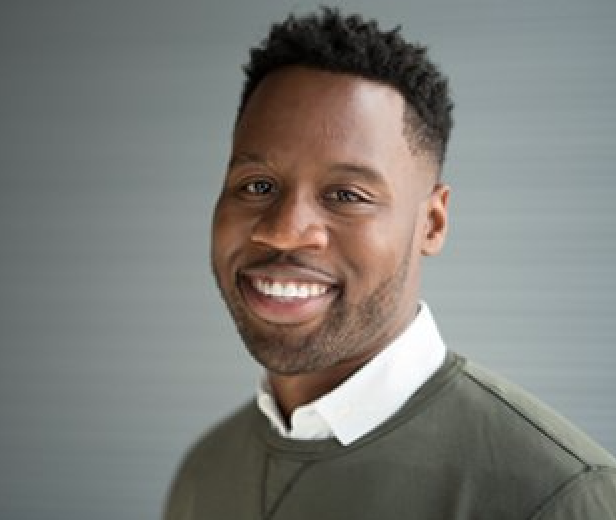Or listen on your favorite podcast app
Apple Podcasts / Google Podcasts / Spotify
—
“Don’t take any wooden nickels.”
A depression-era saying that encourages people not to be cheated or duped, it was a phrase that Kmele Foster’s father told him a lot as a child – and one he never quite understood. But in today’s world of media overload, it can be hard to find the truth in the noise and even harder to tell when you’ve been misled.
Having worked as co-host of The Independents, a daily news show on Fox, Kmele is intimately familiar with the pace at which journalists work. And while he believes mistakes aren’t intentional, he knows just how easy it is for the truth to slip through the cracks.
Today, Kmele is trying to change that. As co-founder and Lead Producer at Freethink, a media company telling powerful stories about today’s pioneers changing the world, Kmele is helping create media that promotes what he thinks is the most important story to share.
“We live at the best, most incredible time in human history. A time when people have this enormous individual capacity and ability, because of all the technology at our disposal, to make massive change in the world. That does not mean that there’s a world with no problems, it means that we’ve never been better positioned to be able to tackle the world’s big problems.”
In this episode, Chad and Kmele discuss the current state of journalism, what it’s like starting a media company today, and what’s in store for the future of the industry.
—
Don’t forget, we have a new partnership with b8ta! B8ta.com gives you access to some of the most innovative and cutting edge consumer tech products.
This week, we will be giving away one Neo Smartpen 1. Enter the giveaway for a chance to win!
Quotes by Kmele:
5:40 – “The reality is that the appetite for content is still growing and the interest in finding new, interesting voices that resonate with you is something that a lot of people are still doing. So, there’s definitely an opportunity. And there’s no question that there will always be a demand. It’s a question of whether or not you’re able to find the right kind of stories to tell”
7:10 – Inspiration from Kmele’s father: “Don’t take any wooden nickels.” and “Your attitude defines your altitude.”
15:50 – “Some of the processes that are interesting [about the news cycle] is the degree to which people, who are actually responsible for helping to craft the news, are depending on other people’s reporting. They don’t necessarily have a lot of first-hand experience. In a 24-hour news cycle, there can only be so much vetting of a particular story that ends up on the air. And I think I had an expectation that the gatekeepers were a little bit more careful, we’re being watched in a way that was a bit more deliberate. But the capacity for errors, the very human nature of the project, of the process of creating the news, is something that shouldn’t have been surprising to me, but definitely was. And I think that’s probably something that would surprise most people, especially today, when we talk about the post-truth era, et cetera. There’s a sensibility that what journalists do is sacred and that what they do is almost mystical. They collect the truth and they bring it to you… But it’s necessarily a human endeavor and there’s necessarily some subjectivity in any human endeavor. And as a result, that really ought to change our relationship to the news. It ought to change this kind of expectation that we bring to bare when we’re reading a story in a publication or watching our favorite commentators talk about things. They’re human. They’re coloring the story and it’s an unavoidable reality. And if we adjust our expectations, we almost certainly can get a better product. We’re able to help hold journalists to the appropriate standard, rather than this unattainable standard of perfect oracle.”
29:30 – “We live at the best, most incredible time in human history. A time when people have this enormous individual capacity and ability, because of all the technology at our disposal, to make massive change in the world. That does not mean that there’s a world with no problems, it means that we’ve never been better positioned to be able to tackle the world’s big problems.”
39:05 – “There are a lot of opportunities to take established narratives that seem pretty black and white, that can often be very bleak, and enriching them by asking provocative questions at the margins that force us to imagine possibilities that we just couldn’t have before.”
49:30 – “It’s vitally important to remember how essential growth is. How essential it is for us to achieve new and better ways of doing things. Because stasis isn’t an option. Entropy requires that things will degrade and wear down. We can’t stand still. So we should always be looking for ways to push forward, to advance, to grow, to grow the economy, to expand our abilities and capacities from a technological standpoint, and to really ask why not as opposed to whether or not to imagine whether or not we should do something.”



